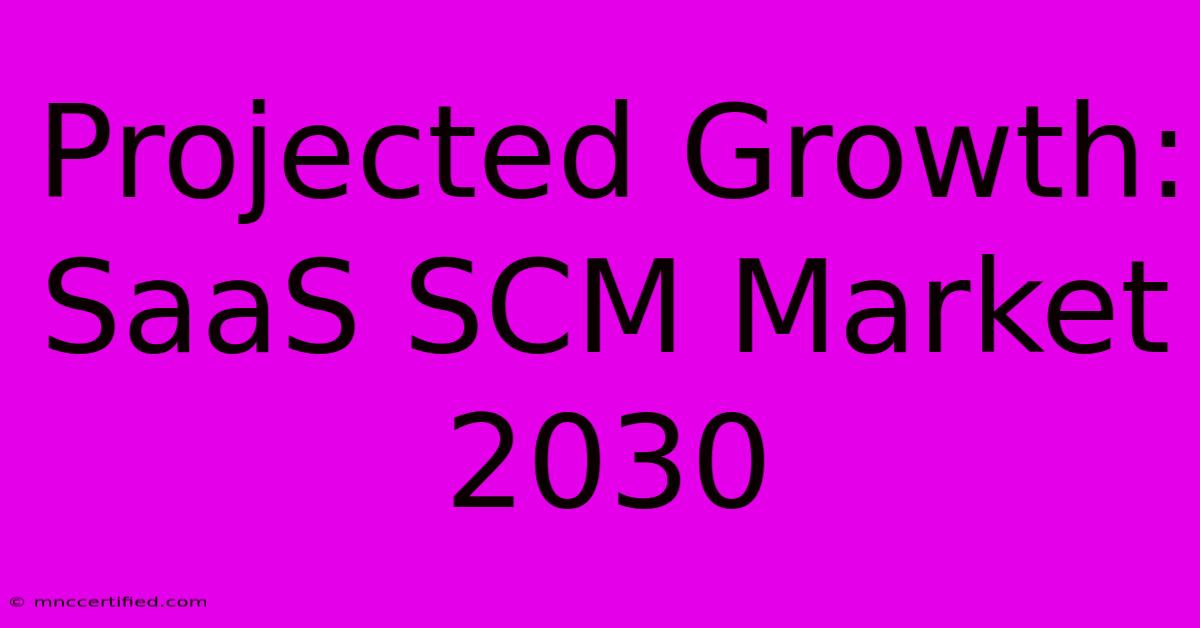Projected Growth: SaaS SCM Market 2030

Table of Contents
Projected Growth: SaaS SCM Market 2030
The Software as a Service (SaaS) Supply Chain Management (SCM) market is experiencing explosive growth, and projections for 2030 paint a picture of significant expansion. This article delves into the key factors driving this growth, analyzes market trends, and explores the opportunities and challenges ahead for businesses in this dynamic sector.
The SaaS SCM Market: A Booming Landscape
The global SaaS SCM market is booming, fueled by the increasing adoption of cloud-based solutions across various industries. Businesses are increasingly recognizing the benefits of SaaS SCM solutions over traditional on-premise systems, leading to a surge in market demand. Key drivers include:
- Enhanced Visibility and Collaboration: SaaS platforms provide real-time visibility into the entire supply chain, fostering better collaboration between stakeholders, from suppliers to customers. This improved transparency streamlines operations and reduces bottlenecks.
- Cost Optimization: SaaS solutions eliminate the need for significant upfront investments in hardware and infrastructure, reducing IT costs and improving ROI. Scalability is also a key advantage, allowing businesses to adjust their resource allocation based on fluctuating demands.
- Improved Agility and Flexibility: SaaS SCM systems are adaptable and can be quickly configured to meet evolving business needs. This agility is crucial in today's dynamic market environment, where disruptions are frequent.
- Advanced Analytics and Data-Driven Decision Making: Modern SaaS SCM platforms integrate advanced analytics capabilities, providing valuable insights into supply chain performance. This data-driven approach allows businesses to optimize their strategies and make informed decisions.
- Increased Automation: Automation of various SCM processes, such as order processing, inventory management, and logistics, is a key benefit of SaaS platforms. Automation leads to increased efficiency and reduced human error.
Market Segmentation and Key Players
The SaaS SCM market is segmented by various factors, including deployment mode, organization size, industry vertical, and functionality. Major players in the market include established ERP vendors like SAP, Oracle, and Microsoft, alongside specialized SaaS SCM providers such as Blue Yonder, Infor, and JDA Software. The competitive landscape is dynamic, with continuous innovation and consolidation shaping the market.
Projected Growth to 2030: A Multi-Billion Dollar Market
While precise figures vary depending on the research firm, most analysts project significant growth in the SaaS SCM market by 2030. We're looking at a multi-billion dollar market, with compound annual growth rates (CAGRs) ranging from 15% to 20% or even higher, depending on the specific segment and geographical region. This substantial growth underscores the increasing importance of SaaS SCM solutions in driving business efficiency and competitiveness.
Factors Influencing Growth Projections
Several factors contribute to these optimistic projections:
- Growing Adoption of Cloud Technologies: The continued migration to the cloud will significantly impact the SaaS SCM market's growth.
- Increasing Demand for Real-Time Visibility and Analytics: Businesses will continue to prioritize real-time data and advanced analytics capabilities.
- Expansion into Emerging Markets: Growth in developing economies will fuel demand for affordable and scalable SaaS SCM solutions.
- Rise of Artificial Intelligence (AI) and Machine Learning (ML): The integration of AI and ML in SaaS SCM platforms will enhance automation and predictive capabilities.
Challenges and Opportunities
Despite the positive outlook, challenges remain:
- Data Security and Privacy Concerns: Ensuring data security and compliance with data privacy regulations is crucial for SaaS SCM providers.
- Integration with Legacy Systems: Integrating SaaS SCM solutions with existing on-premise systems can be complex and time-consuming.
- Lack of Skilled Workforce: Finding and retaining skilled professionals with expertise in SaaS SCM is a challenge for many businesses.
However, these challenges also present opportunities for innovation and growth. Companies that can effectively address these issues will be well-positioned to capitalize on the market's potential. This includes investing in cybersecurity, developing seamless integration solutions, and providing robust training programs for employees.
Conclusion: A Future Driven by SaaS SCM
The projected growth of the SaaS SCM market by 2030 is undeniable. As businesses increasingly rely on cloud-based solutions to optimize their supply chains, the demand for SaaS SCM platforms will only continue to rise. By understanding the key drivers, challenges, and opportunities within this market, businesses can position themselves for success in this rapidly evolving landscape. Investing in a robust SaaS SCM solution is no longer a luxury but a necessity for businesses aiming for sustainable growth and competitiveness in the years to come.

Thank you for visiting our website wich cover about Projected Growth: SaaS SCM Market 2030. We hope the information provided has been useful to you. Feel free to contact us if you have any questions or need further assistance. See you next time and dont miss to bookmark.
Featured Posts
-
Auto Insurance Grand Prairie
Nov 30, 2024
-
Only Fans Elite Sophie Rains Stats
Nov 30, 2024
-
Cool Insuring Arena Schedule
Nov 30, 2024
-
Crown Life Insurance Company
Nov 30, 2024
-
Iowa Vs Nebraska Husker Maxs Season Prediction
Nov 30, 2024